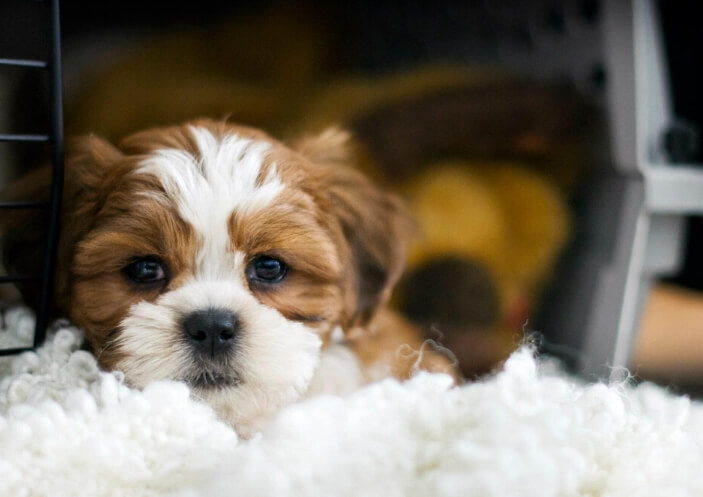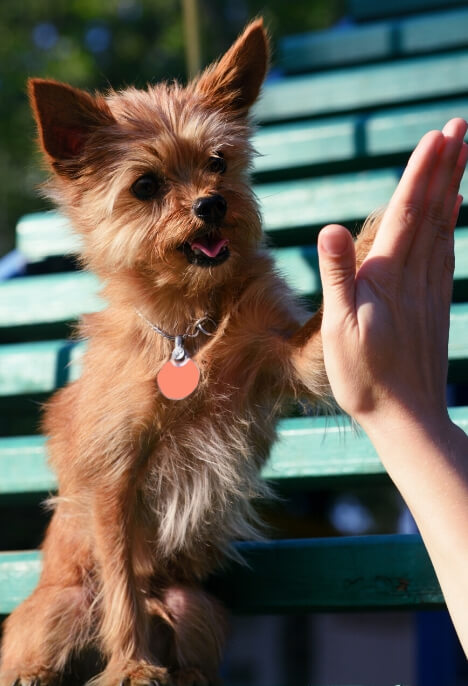So you’ve gotten your new puppy… and you are wondering what are the first things to do.
We know that you love your new fur family member and are excited to have them integrate into your family and routine, but have you thought about the first important items to take care of to make sure that both you and your new puppy are happy?
Over the next few weeks, we will be publishing a series of articles looking in more detail at various topics to help you ensure your new puppy is learning behaviours that will help them and you live harmoniously.
In today’s article, we will be discussing crate training and house-breaking. These behaviours are interrelated and need to be addressed as soon as your puppy comes home.
As you have probably started to realize puppies, although irresistible, can be very time-consuming. Raising a puppy requires a regular schedule and a high level of commitment. They are fed more often, usually 3-4 times a day and require supervised bathroom breaks outdoors.
 Crate Training
Crate Training
We want to address crate training and the importance of using a crate. Crating is critical and needs to be taught with patience and kindness. Crating your puppy helps to develop their independence which also helps to avoid separation anxiety. It can also help your puppy stay out of trouble and eliminate bad behaviours like chewing.
A young puppy can and should be left alone for short periods of time, and spending time in a crate is safe.
The crate you choose should be big enough to allow your puppy to stand up and turn around, and we recommend placing it in a calm quiet area in your home. If your crate is too large they may eliminate in it – so make sure that it is the right size for your pup. Crates should be thought of like a den or bedroom they can go to and rest.
House-training
House-training is one of the first things you will teach your puppy. For your puppy to be successful you need to be patient, consistent, and start as soon as you bring your puppy home.
 Most puppies cannot control their bladders and bowels until they are at least 12 weeks of age. The rule of thumb we use to determine how long they can hold themselves is the number of months plus 1 converted to hours. For example – if your puppy is 12 weeks old (3 months) they should be able to hold for 4 hours (3 plus 1). Puppies will normally go within 30 minutes after they eat, after active play and when they wake up.
Most puppies cannot control their bladders and bowels until they are at least 12 weeks of age. The rule of thumb we use to determine how long they can hold themselves is the number of months plus 1 converted to hours. For example – if your puppy is 12 weeks old (3 months) they should be able to hold for 4 hours (3 plus 1). Puppies will normally go within 30 minutes after they eat, after active play and when they wake up.
To build your bond with your puppy there are a couple of things that you need to do to keep the learning experience positive:
- Praise your puppy when it does what you want it to do. How do you praise? You can use a verbal word/phrase such as “Good dog” in a happy tone and/or a treat when they go.
- If your puppy has an accident do not punish as they have not learned yet and won’t understand what they have done wrong. Punishing a young dog creates fear and they could fear you. Also, be sure to use a cleaner that will eliminate the odor entirely. If your dog picks up the scent, it may think the area is OK to use again.
- If you catch them eliminating in an inappropriate place bring them outside.
Here are a 5 Tips to Assist in House-Breaking your New Puppy:
- Make a Schedule and Stick to a Routine – This is how your puppy learns what is expected. Try to get up at the same time each day and take them outside immediately. Meals should be at the same time each day and take them out as soon as they finish. Use the same door so they can learn how to let you know on their own. Ensure all family members are aware of the schedule and help to make sure there is consistency.
- Watch for Signals – Your puppy could be signaling that they need to go outside if you see them sniffing, circling, or pacing. If you catch it in the middle of an accident, say “no” firmly to stop them and then take the dog outside to finish. Make sure to give them praise.
- Choose a Keyword – Use a phrase like “outside” and use it consistently. Always bring your puppy to the same area outside while house-training. The odors in this area will encourage it to urinate and defecate there again.
- Avoid Play when on a Bathroom Break – Puppies love to play and when you take them outside – when they wake up, or when you come home – they may think it’s playtime. Be calm, quiet, and ignore them when you take them outside until they go to the bathroom.
- Use a Crate – As we discussed above, your puppy should stay in a crate when you are not able to supervise them. Their crate becomes their cozy den and they will want to keep it clean.
House-training may take several months, so have patience.
Remember that your puppy wants to please you, it just needs to learn how. Be clear with the puppy when you praise or correct its actions. Do not be surprised, particularly when your puppy is young, that there can and will be setbacks. As your puppy matures and goes through new and different situations they may temporarily lose their house-breaking skill. If this occurs, be sure to also confirm that your puppy doesn’t have an underlying health issue.
The best way to keep your puppy safe is to supervise it at all times or keep them in a crate for short periods of time.
We are here to help, our daycare is currently open and we are offering initial complimentary telephone or virtual Zoom consultations to build the foundation for you and your puppy.

